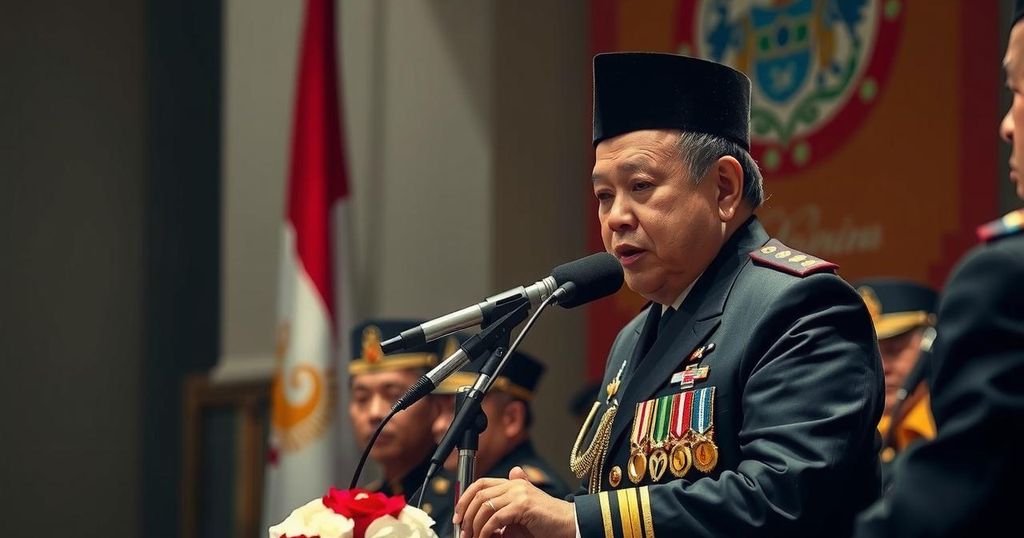Prabowo Subianto Sworn in as Indonesia’s Eighth President

Prabowo Subianto was inaugurated as the eighth President of Indonesia, having transitioned from an ex-General accused of rights abuses to a politically endorsed leader. Supported by former rival Joko Widodo, Subianto vows to maintain continuity in governance. He was elected amidst a global backdrop, facing various economic and geopolitical challenges as he assumes office alongside Vice President Gibran Rakabuming Raka.
On Sunday, Prabowo Subianto was officially sworn in as the eighth President of Indonesia, the world’s most populous Muslim-majority nation. His inauguration marks a significant transition from being an accused ex-General linked to human rights abuses during Indonesia’s military dictatorship to ascending to the Presidential palace. At the age of 73, former Defense Minister Subianto gained the fervent support of thousands of backers who celebrated his achievement while he took his oath of office on the Quran in the presence of legislative members and international dignitaries. The inauguration ceremony in Jakarta was attended by leaders and senior officials from over 40 nations, including prominent figures from the United Kingdom, France, the United States, Saudi Arabia, Russia, South Korea, China, Australia, and other Southeast Asian countries. Mr. Subianto, who has been a longstanding opponent of the particularly popular President Joko Widodo, famously contested the presidency against him twice in 2014 and 2019 without recognizing his electoral defeats. Following Mr. Widodo’s reelection, he appointed Mr. Subianto to the position of defense chief, forming an unlikely alliance despite their differing political affiliations. During his campaign, Mr. Subianto positioned himself as the successor to President Widodo, committing to uphold key initiatives such as the construction of a new capital city and restrictions on the export of raw materials, all aimed at bolstering the domestic economy. His candidacy was bolstered by Mr. Widodo’s endorsement, culminating in a decisive victory in the direct presidential election held in February. Mr. Subianto was sworn in alongside his vice president, Gibran Rakabuming Raka, the 37-year-old former mayor of Surakarta and son of President Widodo. Although Indonesian presidents do not typically endorse candidates, Mr. Widodo’s support for Subianto was notable given the history of their rivalry. Despite his ascension, questions loom about how Mr. Subianto will govern the largest economy in Southeast Asia, particularly given that nearly 90% of Indonesia’s 282 million population identifies as Muslim. His tenure contrasts sharply with that of Mr. Widodo, who was the first president to rise from humble beginnings and frequently engaged with the working-class populace. Mr. Subianto’s military career includes a stint as a special forces commander, during which he was accused of significant human rights violations. He was expelled from the army in 1998 amidst allegations of involvement in the kidnapping and torture of activists but has never faced prosecution. Following these events, he spent several years in self-imposed exile in Jordan. The recent events led to the last-minute cancellation of Jordanian King Abdullah II’s attendance at the ceremony due to escalating tensions in the Middle East, although he designated Foreign Affairs Minister Nancy Namrouqa to attend in his place. Mr. Subianto had previously met with King Abdullah to discuss humanitarian aid for Gaza. Now leading a diverse and economically vibrant nation, Mr. Subianto must navigate through a landscape beset by global economic challenges and regional tensions that include territorial disputes and the ongoing rivalry between the United States and China.
Prabowo Subianto’s rise to the presidency signals a pivotal moment in Indonesia’s political landscape. His ascent comes after a contentious political career marked by significant allegations of human rights abuses and a longstanding rivalry with former President Joko Widodo. Subianto’s focus on continuity with Widodo’s policies reflects a crucial strategy for navigating domestic and international economic challenges. Additionally, his alliance with the popular outgoing president illustrates a willingness to bridge political divides in pursuit of national governance. This context is essential in understanding the potential impacts of his administration on Indonesia’s socioeconomic dynamics and international relations.
In conclusion, Prabowo Subianto’s inauguration as Indonesia’s new president represents a complex intersection of past conflicts and future aspirations within Southeast Asia’s largest economy. As he prepares to govern, the intricate balance of maintaining continuity with previous policies while addressing Indonesia’s diverse challenges will be critical to his administration’s success. With his background and established relationships with key political figures, Mr. Subianto’s leadership will be closely scrutinized in the coming years, especially in regard to human rights and economic development.
Original Source: www.thehindu.com







